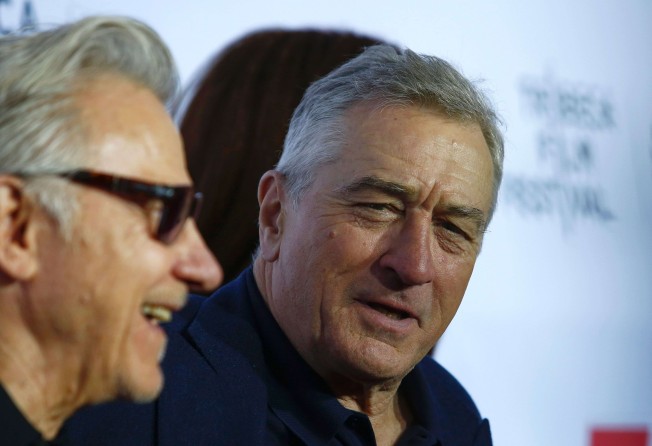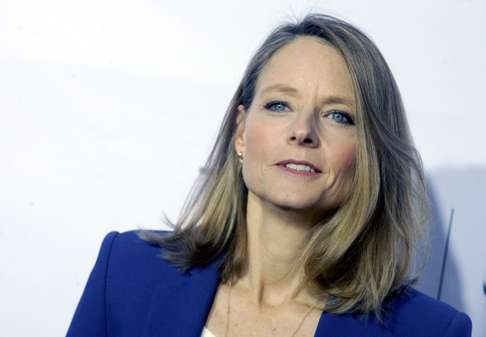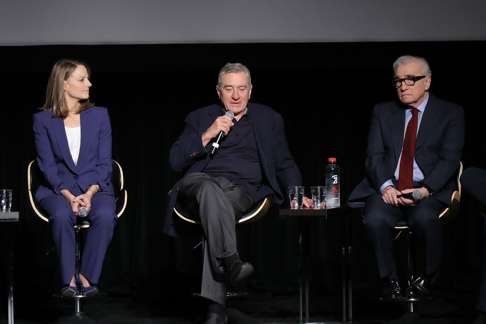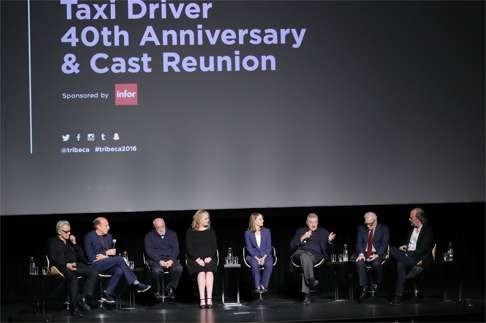You talkin’ to me? Director and cast of Taxi Driver reunite for 40th anniversary
Robert De Niro, Harvey Keitel, Cybill Shepherd, Jodie Foster and Martin Scorsese and others gather for screening at Tribeca Film Festival

You talkin’ to me? Sorry, not this time.
Robert De Niro bypassed waiting media on the red carpet before heading into a Tribeca Film Festival screening of Taxi Driver in celebration of the iconic film’s 40th anniversary.
But inside, he introduced the film at the Beacon Theatre as cast and key creators reunited, mocking the famous line of his famous character, deranged driver Travis Bickle.
De Niro reportedly told the crowd every day for 40 (bleepin’) years “at least one of you has come up to me and said – what do you think – ‘You talkin’ to me?’”
Director Martin Scorsese, who was a no-show on the red carpet, also attended. Cast members Jodie Foster, Cybill Shepherd and the screenwriter, Paul Schrader, posed for photos and shared memories with reporters about their roles in the film considered by some to be in the Top 100 of all time.
Foster was only 12 but already a Hollywood veteran when she played Iris, a runaway who becomes a child prostitute. Foster began her career as a toddler in modelling and acting in commercials and had worked with Scorsese, playing delinquent tomboy Audrey in his 1974 Alice Doesn’t Live Here Anymore, two years before Taxi Driver was released.

“I knew it was great, and I knew that I was excited to work with Scorsese, enough to fly myself to New York and put myself at a hotel in order to play the part,” says Foster, who was raised in Los Angeles. “I knew that it was something worthwhile.”
She calls her memories “all good,” except, perhaps, for the platform shoes she had to wear.
“And I didn’t like the hot pants. I was embarrassed to have to walk down the street like that,” Foster said. The film’s frank violence, she adds, “today looks like nothing, but was ahead of its time.”
Care, she says, was taken with her on set.
“I remember being fascinated by [make-up artist] Dick Smith mixing all the fake blood together and showing me how he did it and applying all the prosthetics to the different actors,” Foster says. “It really made me love how movies are made. It was a great introduction to all of that.”

John Hinckley Jnr, imprisoned for attempting to assassinate President Ronald Reagan, was influenced in part by the movie. Foster would not comment on Hinckley.
Shepherd, meanwhile, was in it for the chance to work with Scorsese and De Niro.
“It was one of the best experiences of my entire career,” she says. “We were like a guerrilla film group. We were grabbing the stuff, grabbing the shots, and it was really thrilling.”

“Scorsese called my agent and said I’d like a Cybill Shepherd type, and she said how about the real thing? My agent said, OK Cybill, do your hair, do your make-up but don’t talk, and you’ll probably get the part.”
Schrader’s memories are intensely personal. “I wrote this for the best of all reasons. I wrote it as self-therapy. I didn’t write it as a commercial enterprise,” he says. “I wrote it because I was afraid of becoming that character. It was the first script I wrote. Fortunately the spirit of that script, the purgative element of it, survived through the direction and the acting and, eventually, the release. The impulse that caused me to write it is still there on the screen.”
Much about the final scene, with Bickle imagining Foster’s Iris returning to her parents, has been debated for decades. Was all well, or does Bickle’s last twitchy look in his rear view mirror suggest any happiness was fantasy?
“It’s ambiguous,” Schrader says. “On one level this character is entering into his own movie fantasy, the suicidal fantasy that he’s been longing for. Ironically, the only thing wrong with his suicidal fantasy is that he doesn’t get to die.”